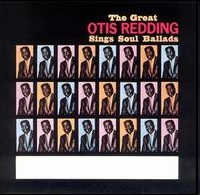

The aptly named Great Otis Redding Sings Soul Ballads (1965) builds upon the strength and relative success of the vocalist's solo debut long-player, Pain in My Heart (1964). The format -- blending a few originals with well-chosen covers -- remained consistent. However, increasingly evident is the strength of Redding's interaction with Booker T. Jones (organ), Steve Cropper (guitar/piano), Donald "Duck" Dunn (bass), and Al Jackson, Jr. (drums), aka Booker T. & the MG's. That relationship is sonically solidified with the singer's seemingly innate ability to sculpt his leads around the powerful Memphis Horn section of Wayne Jackson (trumpet), Charles "Packy" Axton (tenor sax), and Floyd Newman (baritone sax). The results clearly speak for themselves with each of the album's dozen selections as all the proof one needs. Redding's testifyin' on the opener, "That's How Strong My Love Is," was powerful enough to garner the attention of several British Invasion bands. While it was the Rolling Stones' punkish cover that grabbed the most attention, to equal effect the Hollies and the Creation are among the others to have been similarly inspired. Adding to that cyclical experience are the obviously sincere updates of the Chuck Willis' R&B heartbreaker "It's Too Late," "For Your Precious Love" -- which had been a huge hit for the Jerry Butler-led incarnation of the Impressions -- and Sam Cooke's "Nothing Can Change This Love." Of the latter, Redding's take is arguably more powerful as the intimacy of his interpretation perfectly demonstrates the artist's uncanny aptitude for emotional evocation. The Redding-penned titles likewise reflect his mentors, as "Chained and Bound" easily adopts the pleading conviction apparent in one facet of Cooke's music. The samba groove of "I Want to Thank You" and the midtempo bounce of "A Woman, a Lover, a Friend" reflect the lighter, fun-loving side à la Cooke's "Another Saturday Night" and "Everybody Loves to Cha Cha Cha." Saving the best for last, the Redding/Cropper collaboration on the upbeat and bluesy "Mr. Pitiful" -- a nickname given to Redding by a local Memphis DJ -- became the platter's signature side, not to mention a significant crossover hit, landing in the Top Ten of the R&B survey and just missing the Top 40 Pop Singles chart by a solitary position.